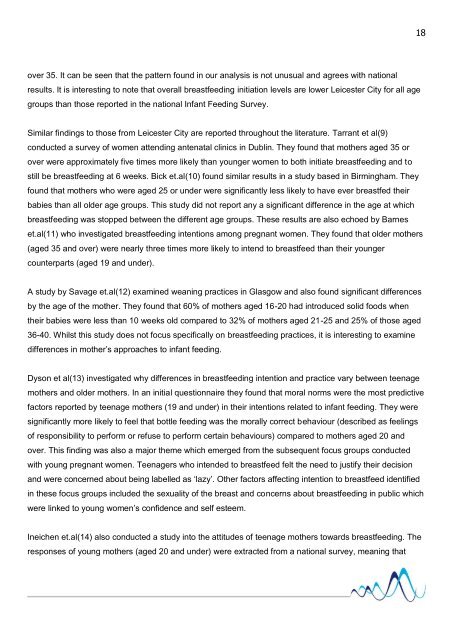Infant Feeding in Leicester City - East Midlands Public Health ...
Infant Feeding in Leicester City - East Midlands Public Health ...
Infant Feeding in Leicester City - East Midlands Public Health ...
You also want an ePaper? Increase the reach of your titles
YUMPU automatically turns print PDFs into web optimized ePapers that Google loves.
18over 35. It can be seen that the pattern found <strong>in</strong> our analysis is not unusual and agrees with nationalresults. It is <strong>in</strong>terest<strong>in</strong>g to note that overall breastfeed<strong>in</strong>g <strong>in</strong>itiation levels are lower <strong>Leicester</strong> <strong>City</strong> for all agegroups than those reported <strong>in</strong> the national <strong>Infant</strong> <strong>Feed<strong>in</strong>g</strong> Survey.Similar f<strong>in</strong>d<strong>in</strong>gs to those from <strong>Leicester</strong> <strong>City</strong> are reported throughout the literature. Tarrant et al(9)conducted a survey of women attend<strong>in</strong>g antenatal cl<strong>in</strong>ics <strong>in</strong> Dubl<strong>in</strong>. They found that mothers aged 35 orover were approximately five times more likely than younger women to both <strong>in</strong>itiate breastfeed<strong>in</strong>g and tostill be breastfeed<strong>in</strong>g at 6 weeks. Bick et.al(10) found similar results <strong>in</strong> a study based <strong>in</strong> Birm<strong>in</strong>gham. Theyfound that mothers who were aged 25 or under were significantly less likely to have ever breastfed theirbabies than all older age groups. This study did not report any a significant difference <strong>in</strong> the age at whichbreastfeed<strong>in</strong>g was stopped between the different age groups. These results are also echoed by Barneset.al(11) who <strong>in</strong>vestigated breastfeed<strong>in</strong>g <strong>in</strong>tentions among pregnant women. They found that older mothers(aged 35 and over) were nearly three times more likely to <strong>in</strong>tend to breastfeed than their youngercounterparts (aged 19 and under).A study by Savage et.al(12) exam<strong>in</strong>ed wean<strong>in</strong>g practices <strong>in</strong> Glasgow and also found significant differencesby the age of the mother. They found that 60% of mothers aged 16-20 had <strong>in</strong>troduced solid foods whentheir babies were less than 10 weeks old compared to 32% of mothers aged 21-25 and 25% of those aged36-40. Whilst this study does not focus specifically on breastfeed<strong>in</strong>g practices, it is <strong>in</strong>terest<strong>in</strong>g to exam<strong>in</strong>edifferences <strong>in</strong> mother‟s approaches to <strong>in</strong>fant feed<strong>in</strong>g.Dyson et al(13) <strong>in</strong>vestigated why differences <strong>in</strong> breastfeed<strong>in</strong>g <strong>in</strong>tention and practice vary between teenagemothers and older mothers. In an <strong>in</strong>itial questionnaire they found that moral norms were the most predictivefactors reported by teenage mothers (19 and under) <strong>in</strong> their <strong>in</strong>tentions related to <strong>in</strong>fant feed<strong>in</strong>g. They weresignificantly more likely to feel that bottle feed<strong>in</strong>g was the morally correct behaviour (described as feel<strong>in</strong>gsof responsibility to perform or refuse to perform certa<strong>in</strong> behaviours) compared to mothers aged 20 andover. This f<strong>in</strong>d<strong>in</strong>g was also a major theme which emerged from the subsequent focus groups conductedwith young pregnant women. Teenagers who <strong>in</strong>tended to breastfeed felt the need to justify their decisionand were concerned about be<strong>in</strong>g labelled as „lazy‟. Other factors affect<strong>in</strong>g <strong>in</strong>tention to breastfeed identified<strong>in</strong> these focus groups <strong>in</strong>cluded the sexuality of the breast and concerns about breastfeed<strong>in</strong>g <strong>in</strong> public whichwere l<strong>in</strong>ked to young women‟s confidence and self esteem.Ineichen et.al(14) also conducted a study <strong>in</strong>to the attitudes of teenage mothers towards breastfeed<strong>in</strong>g. Theresponses of young mothers (aged 20 and under) were extracted from a national survey, mean<strong>in</strong>g that


